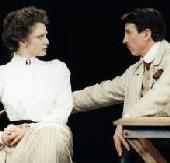SITE GUIDE
SEARCH
REVIEWS
REVIEW ARCHIVES
ADVERTISING AT CURTAINUP
FEATURES
NEWS
Etcetera and
Short Term Listings
LISTINGS
Broadway
Off-Broadway
NYC Restaurants
BOOKS and CDs
OTHER PLACES
Berkshires
London
California
New Jersey
DC
Philadelphia
Elsewhere
QUOTES
TKTS
PLAYWRIGHTS' ALBUMS
LETTERS TO EDITOR
FILM
LINKS
MISCELLANEOUS
Free Updates
Masthead
Writing for Us
A CurtainUp London Review
Uncle Vanya
&
|
Life is boring, stupid and dirty. It drags you down.
--- Vanya |

Ksenia Rappoport as Elena and Petr Semak as Astrov
(Photo: Victor Vasiliev) |
The Maly costumes are very much reminiscent of the photographs of the first production of Uncle Vanya by the Moscow Arts Theatre in 1899, which gives a certain sense of authenticity and integrity. The set evokes a spacious house on a country estate, matching simple manorial space with wooden panels, pine doors and creaky floorboards. The lighting is exceptionally beautiful and its shifts in quality subtly inform the audience of the time of day represented. The house lights are very gradually dimmed and this slow introduction to the world of the play generates Chekhovian pace and atmosphere from the outset. On each introductory player entrance, a door opens to reveal beautiful daylight, at first silhouetting the actor in shadow then illuminating him. Above the characters rest three gargantuan egg-shaped bales of hay, indicating the lurking presence of the farm-estate and the increasingly impending work it requires.
The Maly play in their and Chekhov's native language - Russian. The words in English are shown in surtitles to either side of the stage, more satisfactory than above, as non-Russian speakers can take in the whole stage and still glimpse the translation which is as unobtrusive as possible.
Lev Dodin's direction boasts impeccable expertise with a sensitivity for both the aesthetic and the thematic. The visual beauty of his work is combined with insightful intelligence, so more understated emotions and themes are teased out by gestures and motifs. For example, in one scene, when the whole household is gathered for Professor Serebryakov's (Igor Ivanov) climactic confrontation, each character is distinctly placed, facing each other or facing the audience with asymmetrical angles and reflecting their individual character's outlook. Vanya (Sergey Kuryshev) holds a bunch of Autumn roses picked for Elena (Ksenia Rappoport). As he protests against the Professor's insensitive and cavalier proposals, the roses are a token of Vanya's culpable behaviour over the past month: his passion for Elena and his neglect of the estate, which undermines his moral authority. In another scene, Elena vents her frustration by playing the xylophone on her husband's plethora of medical bottles, the mess of which Sonya then quietly clears up. Although a plausible detailed scenario in itself, this finely-observed scene resonates with greater symbolism, as Sonya ultimately returns to the mundane tasks of everyday life and recuperates the damage caused by Elena's destructive beauty.
Under this skilled direction, the actors excel. Sergey Kuryshev is a haplessly endearing Vanya -- articulate, dynamic and lazy. His demonstrative Oblomovism navigates a fine course between tragic despair and buffoonery. The more pronounced role of the Professor makes Vanya's tragedy that of disillusionment rather than only unrequited love. The deconstruction of his faith in the Professor's academic brilliance destabilizes Vanya's sense that his life working to send money to his brother-in-law was in any way worthwhile. Vanya's fellow drudge Sonya (Elena Kalinina) is particularly sympathetic: loving, capable and active. She is the character least spoilt by the soul-destroying grind of existence and her determination to continue life in all its hopelessness and hard work has the air of tragic nobility. Ksenia Rappoport nicely conveys Elena's inadvertently detrimental impact and her contagious idleness without making her a dislikeable character. Petr Semak is an egotistical Doctor Astrov whose crusade against forestry decline does not make him more sensitive to Sonya's love and his attraction to Elena is simply lust for a beautiful woman.
The Maly Theatre have captured the very essence of Chekhov's vision of humanity: life on an interminably falling cadence with characters who are tangibly plausible, whose plights aren't particularly heroic or even sensational, but who are extremely poignant and affecting. Some performances just seem to imprint their version of plays and characters on the mind. This rare opportunity to see how one of Russia's finest theatre companies handle Uncle Vanya is one such definitive production, against which all subsequent ones will necessarily be judged.
Editor's Note: For reviews of other productions of this and other Chekhov plays, see our Chekhov Backgrounder.
| Uncle Vanya
Written by Anton Chekhov Directed by Lev Dodin Starring: Sergey Kuryshev With: Igor Ivanov, Elena Kalinina, Vitaly Pichik, Ksenia Rappoport, Tatiana Schuko, Petr Semak, Nina Semenova, Alexander Zavyalov Design: David Borovsky Stage Manager: Olga Dazidenko Costume Design: Irina Tsvetkova, Maria Formina Lighting: Ekaterina Dorofeeva, Vitally Skorodumov Sound: Vladimir Troyan Running time: Three hours 30 minutes with one interval Box Office: 0845 120 7554 Booking at the Barbican London to 28th May 2005 and then 31st May to 4th June The Lowry, Salford 7th to 11th June Warwick Arts Centre Coventry 14th to 18th June The Oxford Playhouse Reviewed by Charlotte Loveridge based on 24th May performance at the Barbican Theatre, London EC2 (Tube: Barbican) |


Mendes at the Donmar
Our Review

Peter Ackroyd's History of London: The Biography

London Sketchbook

Retold by Tina Packer of Shakespeare & Co. Click image to buy.
Our Review

6, 500 Comparative Phrases including 800 Shakespearean Metaphors by CurtainUp's editor.
Click image to buy.
Go here for details and larger image.
